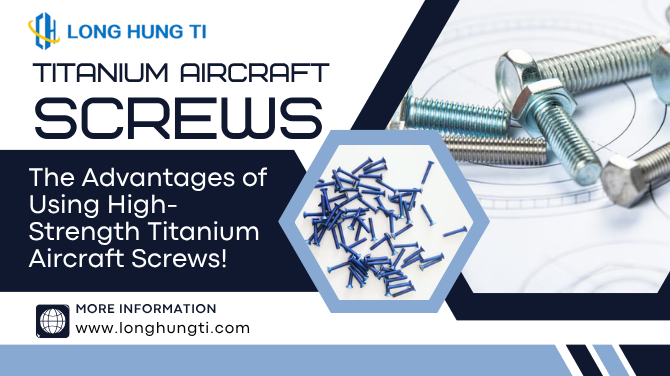Notifications

9 minutes, 51 seconds
-22 Views 0 Comments 0 Likes 0 Reviews

In the aerospace industry, where every gram counts and failure is not an option, the choice of fasteners can significantly impact an aircraft's performance, safety, and longevity. Among the various materials available, titanium aircraft screws have emerged as the preferred solution for critical applications due to their unparalleled strength-to-weight ratio, corrosion resistance, and fatigue performance. As aviation technology advances and demands for fuel efficiency and durability increase, manufacturers and engineers are turning to high-strength titanium aircraft screws to meet these rigorous requirements.
At Shen Zhen Long Hung Titanium Ltd., we specialize in producing premium-grade titanium aircraft screws that exceed industry standards. With decades of expertise in aerospace fastener manufacturing, we understand the critical role these components play in ensuring structural integrity and operational reliability.
Before delving into the benefits of titanium aircraft screws, it’s important to understand why titanium is the material of choice for aerospace applications.
1. Superior Strength-to-Weight Ratio
One of the most significant advantages of titanium is its exceptional strength-to-weight ratio. Compared to steel, titanium offers comparable (or even greater) tensile strength while being approximately 45% lighter. This weight reduction is crucial in aviation, where every kilogram saved translates to improved fuel efficiency, increased payload capacity, and enhanced flight performance.
2. Outstanding Corrosion Resistance
Aircraft are exposed to extreme environmental conditions, including high humidity, saltwater exposure (in coastal operations), and temperature fluctuations. Unlike aluminum or steel, which can corrode over time, titanium naturally forms a protective oxide layer that prevents rust and degradation. This makes titanium aircraft screws ideal for:
3. High Fatigue Resistance
Aircraft components are subjected to constant vibrations, pressure cycles, and dynamic loads. Titanium’s fatigue resistance ensures that screws and fasteners maintain their integrity over thousands of flight hours, reducing the risk of mechanical failure and the need for frequent replacements.
4. Temperature Stability
From the freezing temperatures at high altitudes to the intense heat generated by engines, titanium aircraft screws perform reliably across a wide thermal range. Unlike aluminum, which weakens at elevated temperatures, titanium retains its structural integrity, making it suitable for:
5. Non-Magnetic Properties
In avionics and sensitive electronic systems, magnetic interference can disrupt navigation and communication equipment. Titanium is completely non-magnetic, ensuring compatibility with:
Key Advantages of Titanium Aircraft Screws in Aerospace Applications
Now that we’ve established why titanium is the optimal material, let’s examine the specific benefits of using titanium aircraft screws in modern aviation.
1. Enhanced Fuel Efficiency
Reducing aircraft weight is a top priority for airlines and manufacturers. By replacing steel fasteners with lightweight titanium aircraft screws, airlines can achieve:
2. Increased Safety and Reliability
Aircraft fasteners must withstand extreme forces, vibrations, and stress cycles without failure. Titanium aircraft screws offer:
3. Compliance with Stringent Aerospace Standards
The aerospace industry demands adherence to rigorous quality and safety standards. Reputable manufacturers like Shen Zhen Long Hung Titanium Ltd. ensure that titanium aircraft screws meet:
4. Customization for Specialized Applications
Not all aircraft fasteners are identical. Depending on the application, engineers may require:
A trusted titanium aircraft screw manufacturer like Shen Zhen Long Hung Titanium Ltd. provides bespoke solutions tailored to exact specifications.
5. Cost-Effectiveness Over the Long Term
While titanium aircraft screws may have a higher initial cost than aluminum or steel, their durability and reduced maintenance needs result in:
Applications of Titanium Aircraft Screws in Modern Aviation
The advantages of titanium aircraft screws become even clearer when examining their use in critical aerospace components:
1. Airframe Construction
2. Engine and Turbine Systems
3. Landing Gear and Undercarriage
4. Interior and Cabin Systems
5. Military and Defense Applications
Why Choose Shen Zhen Long Hung Titanium Ltd. as Your Titanium Aircraft Screw Manufacturer?
Selecting the right supplier for titanium aircraft screws is critical to ensuring performance and compliance. Here’s why Shen Zhen Long Hung Titanium Ltd. stands out:
1. Aerospace-Grade Material Selection
We use only Grade 5 (Ti-6Al-4V) and Grade 2 titanium, certified for aerospace applications.
2. Precision Manufacturing Processes
Our CNC machining, cold forging, and thread rolling ensure flawless tolerances and fatigue resistance.
3. Rigorous Quality Control
Every batch undergoes spectral analysis, mechanical testing, and dimensional inspections.
4. Custom Engineering Support
From prototyping to mass production, we provide tailored solutions for unique aerospace needs.
5. Global Compliance & Certifications
Our screws meet AS9100, ASTM, and MIL-SPEC requirements for global aerospace projects.
The shift toward titanium aircraft screws reflects the aviation industry’s pursuit of lighter, stronger, and more durable solutions. By partnering with Shen Zhen Long Hung Titanium Ltd., you gain access to:
For reliable, high-strength titanium aircraft screws, contact Shen Zhen Long Hung Titanium Ltd. today to discuss your project requirements.
1. Why are titanium screws preferred over steel in aircraft applications?
Titanium screws offer a 45% lighter weight than steel while maintaining comparable (or superior) strength. They also provide exceptional corrosion resistance, fatigue performance, and temperature stability—critical factors for aircraft safety and longevity.
2. How do titanium aircraft screws improve fuel efficiency?
By replacing heavier steel fasteners with lightweight titanium screws, aircraft reduce overall weight, leading to:
3. Are titanium aircraft screws more expensive than traditional fasteners?
While titanium screws have a higher upfront cost, their longer lifespan, corrosion resistance, and reduced maintenance needs make them more cost-effective over time—especially in critical aerospace applications.
4. Can titanium screws withstand extreme temperatures in jet engines?
Yes! Unlike aluminum, which weakens at high heat, titanium retains its strength in temperatures ranging from -250°C to 600°C, making it ideal for turbine components, exhaust systems, and engine mounts.
5. What certifications should I look for in titanium aircraft screws?
Ensure your supplier meets:

